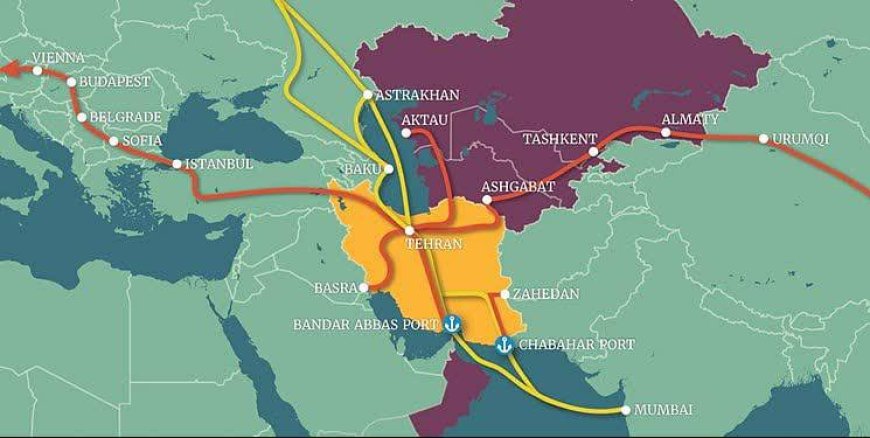The North-South Corridor: A Gateway to New Economic Opportunities?
Corridors, the lifelines of international trade, forge cost-effective and secure transportation routes through land and sea. In today's world economy, corridors hold immense significance, capable of reshaping the geo-economic and geo-political landscape of countries. Among these corridors, the North-South Corridor, conceived by Iran, Russia, and India several decades ago, stands out with its exceptional position and significance.

Established in September 2000, the North-South Corridor aimed to enhance trade relations and expand transportation cooperation between its founding members. Over time, it welcomed 11 additional nations, including Azerbaijan, Armenia, Kazakhstan, Kyrgyzstan, Tajikistan, Turkey, Ukraine, Belarus, Oman, Syria, and Bulgaria. This corridor serves as a vital link connecting the Indian Ocean and the Persian Gulf via Iran, extending through rail, road, sea, river, and air transportation facilities to the Caspian Sea, and then reaching Saint Petersburg and Europe through Russia.
The North-South Corridor holds a distinct advantage over other routes traversing Iran's territory. Unlike competing alternatives, the eastern branch of this corridor remains unparalleled. In the western branch, goods passing through Iran benefit from lower costs and transit times compared to parallel routes such as the Suez Canal. Consequently, the activation of the North-South transit corridor facilitates connections between South and Southeast Asia, Russia, Europe, and the Caucasus region in the western branch. In the eastern branch, landlocked CIS countries gain access to open waters, the Persian Gulf, and the African continent, primarily through the Chabahar-Sarkhs railway axis. These nations also view the east-west corridor as a complementary route, aligning with China's ambitious One Belt, One Road plan. Although the required infrastructure for this new route is yet to be fully developed, Turkey and China have already formulated plans to advance it, potentially posing competition to the North-South Corridor.
Considering the significance of trade routes, it becomes crucial for Iran and the countries involved in the North-South Corridor to address existing challenges. By emphasizing the numerous advantages of this route, particularly its security, they can effectively deter the emergence and strengthening of competing alternatives. The benefits of utilizing the North-South Corridor can be better understood by examining the role of the Eurasian Economic Trade Union.
In 2018, after extensive negotiations, Iran and the Eurasian Economic Union signed a temporary agreement on preferential and advantageous trade. This agreement led to reduced customs duties on hundreds of goods imported from Iran to the Eurasian Economic Union, reciprocated by the Union's exports to Iran. Membership in this corridor framework and cooperation with the Eurasian Economic Union present numerous benefits for Iran and its fellow member countries. Aligning with Iran's strategy of looking eastward, this route allows Iran to harness the capacities of the North-South Corridor effectively. Notably, this trade route has significantly boosted exports for Iran, Russia, and Kazakhstan, enabling these nations to generate substantial revenue. Other member countries have also reaped their respective advantages, fostering improved relations across various domains. Close cooperation with the Eurasian Economic Union and Central Asian countries plays a pivotal role in enhancing the corridor's efficiency and establishing it as a reliable trade route for nations worldwide. It serves as a crucial benchmark for member countries to transform this corridor into a vital artery for international trade.
Nevertheless, the North-South Corridor faces challenges, such as the ongoing Ukraine conflict, which has strained Russia's interactions with Europe across multiple spheres. Additionally, extensive sanctions against Iran and Russia have prompted cautious consideration from many nations. Successfully navigating these obstacles would undoubtedly elevate the North-South Corridor to become one of the most pivotal economic routes globally. Iran and Russia, as key players, will wield significant influence over the future economy and geopolitical landscape of the international system. Therefore, it is imperative to accord special attention to the importance of this corridor and transform it into a crucial trade route, benefiting all countries involved, particularly Iran and Russia.
The North-South Corridor embodies a paradigm shift in global trade, offering new possibilities for economic growth and cooperation. Its realization demands collective efforts, diplomatic engagement, and strategic foresight. By embracing the potential of this corridor, nations can forge a future of prosperity, connectivity, and mutual benefit, propelling the North-South Corridor to its rightful place as a beacon of international trade and a catalyst for global economic transformation.













































